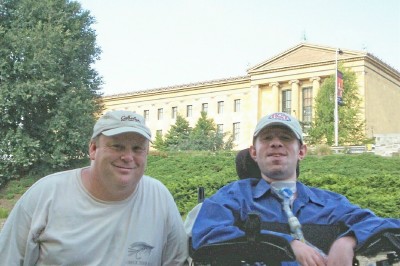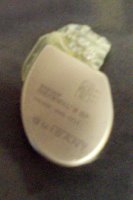PPMD Day 3: My Turn
Part 3 of Winheld's World coverage of Parent Project Muscular Dystrophy’s (PPMD) 2007 Annual Conference, July 12-15, in Philadelphia.When your child receives a diagnosis of Duchenne's, you feel desperate and want a solution to the problem NOW, not five, 10 years down the road. I know that's how my parents felt nearly 25 years ago. Nevertheless, I was a bit disturbed when one parent raised the question of why, if a drug shows promise very early on (say after as little as 28 days), parents shouldn't be able to give that drug to their children.
"Why should our children have to wait 10 years, when they're already in wheelchairs, to start a treatment when we could have already had them on it and prevented that from happening? What kind of life are we giving them?" was his basic argument.
I understand where the guy was coming from. Everyone wants a cure, but taking dangerous shortcuts is not the answer. As one doctor said in response, "I don't want to give your 6-year-old a drug that's going to kill him."
Now, it's also true that when/if a treatment becomes available, there are going to be risks and parents are going to have to make decisions, but at least there will have been years of study so such risks can be minimized.
I'm 29 and we all know the life expectancy of someone with DMD, but you don't see me jumping up and down (well, I wouldn't be able to anyway!) desperate for a cure. The reality is that it's probably not coming for me. Even so, I've been fortunate to live in this day and age. The previous generation of kids with the disease didn't get spinal fusion, they didn't get trachs or g-tubes, they didn't get ventilators or defibrillators.
If the next generation is 15 or 16 years old and in wheelchairs when a cure is found that will stop the respiratory and cardiac aspects of the disease, but does not reverse the damage that's already been done, that would be great. If all you have to deal with in life is being in a wheelchair, it's hardly the end of the world. We live in a world that is growing more accessible every day.
In a breakout session in the afternoon, Mary-Lou Weisman, author of Intensive Care: A Family Love Story, about her son Peter, who had Duchenne's, spoke about ways of dealing with social isolation that those with the disease often face. She spoke of various organizations/activities in which parents can involve their boys. I certainly agreed with that, but for me, it wasn't so much the organized activities, but rather the impromptu gatherings at friends' houses during my teenage years that I really missed. I suggested that parents consider purchasing portable ramps so that their children can get into their friends' homes.

The next breakout session featured yours truly, as part of an expert panel on adults with Duchenne/Becker, moderated by Pat Moeschen (right). Also on the panel were (from left), Jared Aronson, Jason Abramowitz, me; and Evan Stutman (back, right). We spoke about our various occupations and took questions. Someone asked how we learned about our diagnosis and whether we were scared about it. Someone else asked about how we reacted to the transition to a wheelchair. And then, so as not to embarrass anyone in the room, we had a question about sex! Unfortunately, time was up, so we dodged a bullet on that one. My only regret is that we didn't have more time for questions. Maybe next year.

Later in the evening, I returned to the hotel for the lavish Conference Dinner. Some nice speeches were given and some video clips were shown. But what was most interesting to me was the people at each table and their dedication. Just look the distance many in attendance traveled to be there. At my table alone, we had a researcher from Australia and a couple with sons with DMD from the Yukon Territory.
I was about to leave -- until I saw the incredible dessert that was being served. Let me see -- chocolate or traffic? Traffic or chocolate? Yeah, I think I made the right call!







































